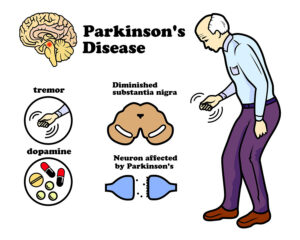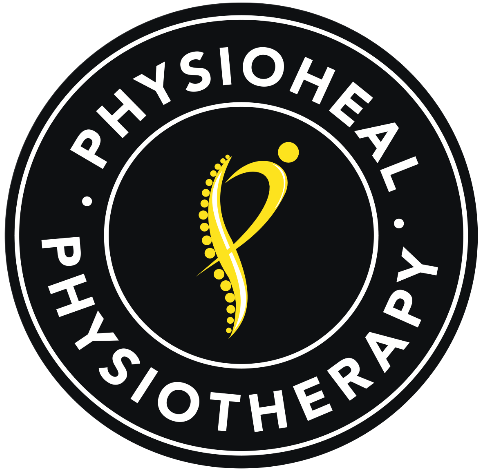We Are Open For Motor Parkinson's Disease Treatment in Gurgaon!
Fill the form and let us call you back.
Comprehensive Guide to Parkinson's Disease (PD): Causes, Symptoms, and Effective Physiotherapy Treatment
Welcome to our informative guide dedicated to shedding light on Parkinson’s Disease (PD) – a complex neurodegenerative disorder. As a premier physiotherapy center, Physioheal Physiotherapy is committed to providing you with comprehensive insights into PD, including its origins, symptoms, and how physiotherapy can be a transformative part of its management.
Understanding Parkinson’s Disease (PD)
Parkinson’s Disease, commonly referred to as PD, is a progressive neurodegenerative disorder that mainly appears in later stages of life. Characterized by a range of symptoms, including bradykinesia (generalized slowing of movements), resting tremors, and rigidity, PD takes a toll on both motor and non-motor functions. Other associated features include sleep disturbances, mood disorders, constipation, loss of smell, and excessive limb movements during sleep.
PD ranks as the second most prevalent neurodegenerative condition globally, following Alzheimer’s disease.

Exploring Parkinson’s Disease in Detail
PD stands as the leading cause of parkinsonian syndrome, accounting for approximately 80% of cases. The remaining cases stem from other neurodegenerative disorders, such as Lewy body dementia.
The historical roots of Parkinson’s Disease trace back 3000 years in Indian and Chinese medicines, with plant-based remedies forming the initial treatment approach. However, the disorder gained prominence in Western medicine through James Parkinson’s 1817 essay, aptly titled the “Essay on the Shaking Palsy.”
The understanding of PD has significantly evolved over the past century. PD primarily impacts the basal ganglia, a complex network of nuclei. The disorder prominently affects the dopaminergic tract, characterized by the loss of dopaminergic neurons in the substantia nigra pars compacta. Dopamine, a critical neurotransmitter, plays a vital role in intercellular communication across various brain systems.
PD’s causative factors are multi-faceted and include exposure to pesticides, genetic predisposition, oxidative stress, and altered function of alpha-synuclein. Current research seeks to unravel the mechanisms underlying alpha-synuclein aggregation and propagation.
The Role of Physiotherapy in PD Management
PD is a prevalent motor disorder, posing challenges for both patients and healthcare professionals. While a cure remains elusive, management strategies are vital to enhancing quality of life. Physiotherapy, in particular, plays a pivotal role in improving mobility, maintaining function, and minimizing complications.
Physiotherapists at Physioheal Physiotherapy intervene during mid-stages of PD, addressing balance and mobility challenges. Early assessment and guidance post-diagnosis can aid in maintaining activity levels and averting potential issues.
In conjunction with physicians, nurses, pharmacists, and social workers, physiotherapists contribute to an interprofessional team approach to manage PD comprehensively. The disorder’s complex blend of motor and non-motor symptoms necessitates a collaborative effort in patient care.
Managing Motor Symptoms and Complications
Motor symptoms, such as tremors, slowness (bradykinesia), rigidity, and gait disturbances, are hallmark features of PD. Non-motor aspects, including depression, dementia, and autonomic dysfunction, often emerge before motor symptoms become apparent.
The rate of disease progression can be influenced by various factors, and while there’s no cure, treatment aims to alleviate symptoms and enhance quality of life. Medications, deep brain stimulation, and physiotherapy are among the multidisciplinary strategies employed to manage PD.
Physiotherapy’s Holistic Approach
Physiotherapy forms an integral component of comprehensive PD management. Our physiotherapist, Dr. Divya Gaur, specializes in tailoring treatment plans to address unique patient needs. The focus includes:
- Mobility Enhancement: Range of motion, walking, and manual activity improvement.
- Complication Prevention: Minimizing secondary issues through movement rehabilitation and education.
- Posture and Balance: Correcting abnormalities and reducing fall risks.
- Muscle Strength and Flexibility: Enhancing physical capacity and joint flexibility.
- Quality of Life Improvement: Through independence enhancement and exercise.
Consult Our Expert Physiotherapist
For those seeking effective Parkinson’s treatment in Gurgaon, Dr. Divya Gaur at Physioheal Physiotherapy is your dedicated partner. Physioheal, led by the esteemed Dr. Divya Gaur, stands as the premier destination for top-tier physiotherapy in Gurgaon. Our dedicated team offers personalized care and effective solutions for a wide range of conditions, ensuring lasting relief and improved well-being. As Gurgaon’s leading physiotherapy clinic, we are committed to providing exceptional care under Dr. Divya Gaur’s guidance, making your journey to a pain-free life our primary goal. We prioritize your well-being, striving to empower you to manage PD’s challenges. To schedule an appointment, reach us at +91-9999259307, book online, or request a phone consultation.
Physioheal Physiotherapy stands alongside you in your journey to manage Parkinson’s Disease, providing personalized care and strategies for enhanced mobility, comfort, and improved quality of life.
